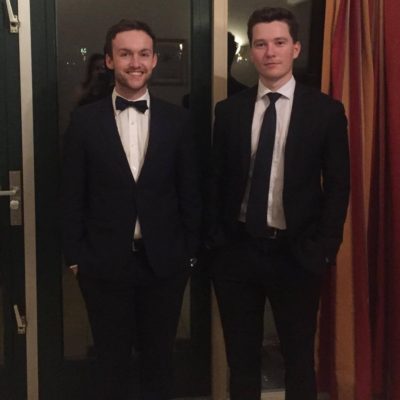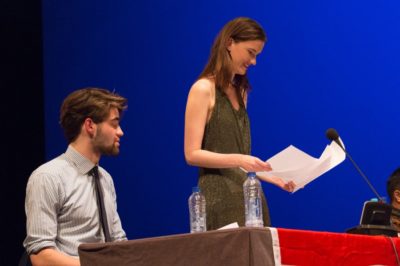Spotlight: Teams that made the break
Before the break we asked seasoned veterans for their background and strategies – now the time has come to talk with some of this year’s most successful teams.
In this article you will find:
James Penn and James Rankin, Auckland A
Lisa Schallenberg, Leiden C
James Penn and James Rankin, Auckland A

James Penn and James Rankin – © private
James and James ranked third in the EPL break. They are debaters from Auckland, New Zealand. The interview was conducted by Lennart Lokstein.
AM: Hey guys! Congratulations to your break. Did you party a lot?
JP: Yeah, too much. Felt it this morning.
AM: I see. So let’s have a look back to your early debate days. When was your first contact with debating? What made you start debating?
JR: I started in 2011, that was when I was at highschool, basically one of may teachers told me to do it, so I did it. Then I was in our New Zealand schools debating team and then later I did it in university.
JP: I started in 2009 as a result of my older sister being in a regional team and getting me involved in debating. At high school I was fortunate to go to Qatar at WSDC and after that I went to three WSDC in Scotland, South Africa and Turkey and then so I guess that was the culmination of my high school debating.
AM: How long have you been debating overall?
JR: Five years for me.
JP: For me a bit more, about seven years.
AM: Who taught you? How did you get better?
JR: So I got some coaching at school from James. He was one of my first coaches along with Paul Smith, who is a DCA for next year’s WUDC. When I was on the New Zealand team I was coached by a guy called Joshua Baxter, who was a top ten speaker at Malaysia Worlds and after that I just picked up things from watching other debaters.
JP: In the very early years my sister helped me a lot to improve. After that a large number of trainers helped me, especially was Steve Hind, a former WUDC winner, and Udayan Mukherjee, who is a former winner of Austrials, so those coaches provided me with a lot of stuff from their university debate experience. After that I think both of us watched a lot of videos, especially in the earlier years.
AM: What’s your approach to win a WUDC preliminary round?
JR: I speak PM and LO, and whip in closing half.
JP: James is the outside and I am the inside positions.
JR: We have been debating together for a while, we don’t have some sheet we follow.
JP: A lot depends on the half, if we are opneing half we just think a lot on our own and then have a small chat and prepare James’ speech. If we are closing half we try to think of the least obvious points we can, and the new directions we can take the debate.
JR: We also try to think of preemptive points, what the other side will say, and prepare responses for them in my speech. We’ve debated together for a while, so it’s quite instinctive.
JP: Then I keep going to the toilet and James gets annoyed.
AM: What did you do in preparation for Worlds?
JP: We just went to two prep tournaments, the New Zealand British Parliamentary Debating Championships – didn’t break at that one – and then we went to the Sydney Mini and reached the semi-finals there, it is a really good tournament with good judges.
JR: in NZ there are far less tournaments than in Europe, so we don’t have that much training tournaments
JP: This is just the 3rd BPS tournament we are competing in this year, because there are so few around.
AM: Did you get any kind of support from your society, university or government?
JR: So we got funding from the debating society which gets funding from the university.
JP: The University of Auckland is really supportive of debating, so they covered most of the expenses. This is really important in enabling us to come to these tournaments, because flights to come so far can cost a lot.
AM: What was your favourite motion ever? Why?
JP: Probably an economics one.
JR: Maybe some direction, a motion is hard…
JP: Sorry, it’s hard to remember a single one. I kind of liked „THW nationalize technology monopolies.“ A motion that I also really like was something like „THBT the government should introduce policies that significantly reduce the level of economic growth in favor of increasing of individual’s leisure time.“ James prefers IR motions and I prefer economics.
AM: How long do you think you will keep debating?
JP: We both have been thinking we would probably „retire“ after this tournament or soon after. So, this is the beginning of the end.
AM: Is there anything more you would like to tell our readers?
JP: Come to New Zealand.
JR: New Zealand and Australia are different countries.
AM: Thank you for the interview and good luck with the outrounds!

Lisa Schallenberg – © Dutch WUDC 2017 // Manuel J. Adams
Lisa Schallenberg, Leiden C
Lisa and her partner Floris Holstege reached the ESL final as well as breaking first in the ESL category. The Achte Minute talked to her on day of the finals. Conducting the interview was Johannes Meiborg.
AM: Hi Lisa, congratulations on reaching the ESL finals! How does it feel to reach the finals at WUDC?
LS: Thank you! I am very happy and excited that I get to speak in the finals with Floris. When we heard yesterday we were also sad because we would’ve hoped to be in the finals with two Leiden teams and Leiden B, unfortunately, didn’t go through on a split. But I am proud of us all and looking forward to the finals!
AM: Which kind of motion would you prefer there?
LS: That’s a hard question! Floris and I have different preferences, which is good because we complement each other in that. I prefer motions about more abstract concepts and Floris prefers IR and economy debates. I don’t have a strong preference on which motion to debate in the finals.
AM: Is there a position which you’d favor about others, e.g. Opening Government or Closing Opposition?
LS: No not really, it varies per debate which positions suits us best. It will depend on the motion!
AM: What is your way of approaching a debate?
LS: I speak first in OG and Floris speaks first in OO. I am a summary speaker and Floris does extensions. We have been giving it a lot of thought and realised that the DLO is more similar to a summary speech because it is the last speech of first half, and DPM is more similar to an extension speech because less has happened in the debate before a DPM and its more a constructive speech. That’s why we decided on these speaker roles.
During prep time we think for about two minutes, I think about the Opp and Floris about the Prop. Then we discuss burdens and what the main case of our opponents will be. Then we choose our points and think about mechanisms and anticipation.
AM: Was there some sort of training you did to prepare for Worlds?
LS: We went to 3 tournaments abroad, UCD IV, Oxford and Cambridge. And to the Dutch tournament Roosevelt open. Furthermore we met up every Tuesday morning for the past three months to do Preps and discuss how to improve.
AM: That’s quite some money to spent. Do you get any sort of support or funding from your society, university, government?
LS: No nothing. We saved up, it was really expensive.
AM: Let’s talk a bit about your career in debating up to this point. What made you start debating?
LS: I started in 2010 when I was in high school. We had to do a debate in school and I was really really nervous. But the teacher thought I was good and he asked me to be part of the debate team. I almost quit right before our first tournament because I was so nervous, but I didn’t want to let my team down. We became national champions that year.
AM: That’s not too bad for a start! How was the transition to university debating?
LS: In 2013 I went to university and became a member of Leiden Debating Union. I went to tournaments in the Netherlands and learned a lot more about debating. It took me about 1.5 years into University before I got my first tournament break.
AM: Did you have somebody to teach you? How did you improve?
LS: I was never coached, unfortunately. But we did have many good debaters at our union like Senna Maatoug, Karin Merckens and Daan Welling. I think I mostly learned by example and by experience.
AM: How long do you think you will keep on debating?
LS: This is my final big competition. I don’t say that I will never go to another tournament again, but I will not attend EUDC or WUDC anymore and the intensity of my debating career is going to be a lot lower from now on. I have done it for a long time and debating has been a massive part of my life. But I want to develop in other ways as well and I feel like I need to explore other interests and talents.
AM: At next worlds, there will be a change regarding the teams being able to choose in which category they break, if they qualify for more than one. If hypothetically you had broken in the open category: Would you go for the Open break or for the ESL break?
LS: I identify as an ESL speaker so I would love to participate in that category in every scenario. However, it does not make sense to me that I did not get to compete against the best ESL teams in the world (IIUM A, IIUM B, Tel Aviv A and Leiden A). You don’t lose your language barrier the moment you become good enough to break open, so to me it makes no sense to ban them from the ESL break. I really hope that in the future teams will be allowed to double break.
AM: Is there anything else you want to say to our readers?
LS: I hope you are enjoying every speech you are giving. Even if you feel like you are not growing fast enough, remember that you are growing even if you don’t always notice it. But debating is also a lot of fun and I want to encourage everyone to realise that and enjoy every second of it.
jm./lok.





